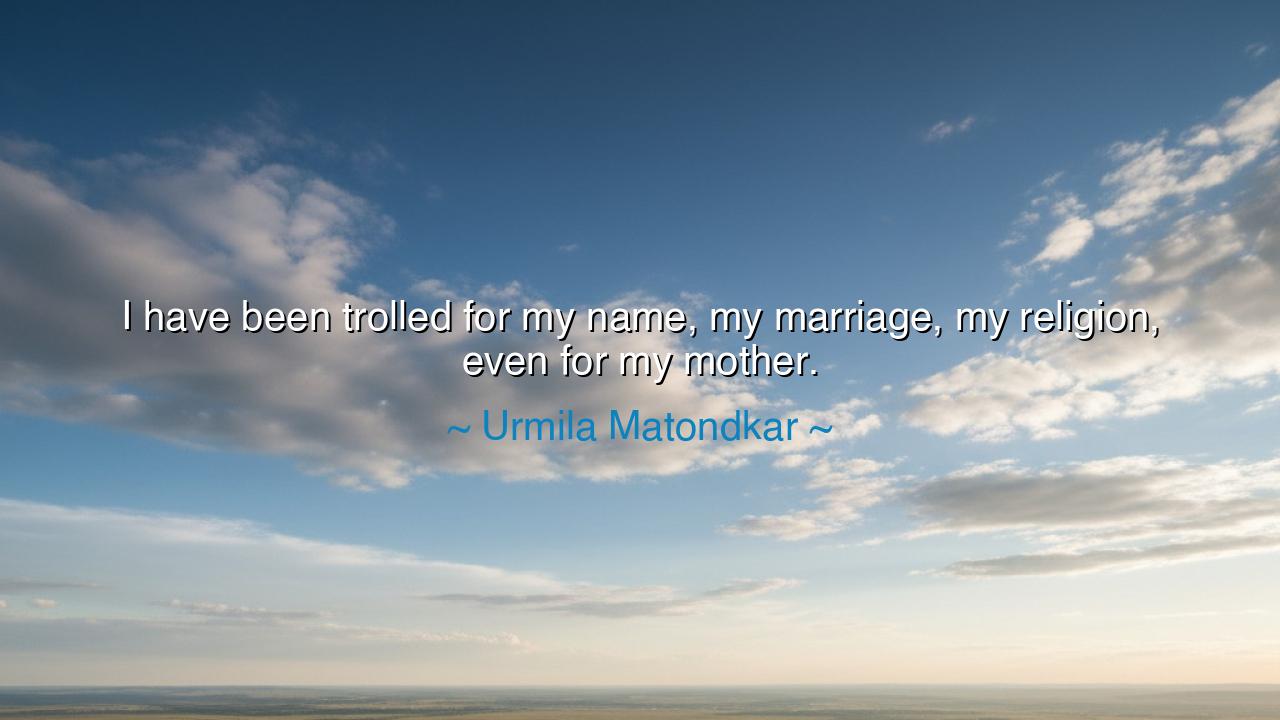
I have been trolled for my name, my marriage, my religion, even






The words of Urmila Matondkar — "I have been trolled for my name, my marriage, my religion, even for my mother." — carry the weight of wounds that are both deeply personal and tragically universal. In these words we hear the voice of one who has endured the arrows of mockery, not for her deeds alone, but for the very foundations of her identity: her birth, her love, her faith, her family. To be attacked for these is to be struck at the core of one’s being, for they are not garments one can shed, but roots that cannot be severed. Her lament is both a cry of pain and a testament of endurance in a world where cruelty is amplified through faceless voices.
The origin of this truth lies in the modern arena of public life, where the stage of discourse has become shadowed by the noise of trolling — the artless mockery of those who hide behind anonymity. Yet Matondkar’s plight is not confined to the digital age. Through history, men and women who stood in the light of public scrutiny were often slandered, ridiculed, and judged not only for their choices but for their very identities. What she suffers is but the modern face of an ancient trial: the human tendency to strike at others for their difference, for their courage, or simply for their visibility.
Consider the tale of Socrates, who was condemned not for crime, but for being himself — for his questions, his manner, his refusal to conform. His accusers mocked his speech, his poverty, his associations, even his devotion to philosophy. Like Matondkar, he bore the bitterness of a society that could not tolerate his presence as he was. Yet he drank the hemlock unbowed, declaring that a life of integrity was more precious than the approval of the crowd. From him we learn that mockery, however sharp, cannot pierce the armor of the spirit that holds fast to truth.
Or recall Mahatma Gandhi, who was derided for his clothing, his frail body, his insistence on simplicity. His enemies mocked his spirituality, his politics, and his defiance of empire. Even his closest companions sometimes ridiculed his choices. Yet his quiet strength transformed insult into power, and his very frailty became the symbol of unyielding resistance. Gandhi, like Matondkar, was attacked not only for his actions but for his very way of being. Yet from that trial arose a movement that liberated a nation.
The teaching here is twofold. First, those who rise into the public eye, whether by art, by leadership, or by principle, must expect to bear the burden of mockery. The crowd often fears what it does not understand, and envy sharpens tongues. Second, the dignity of the one attacked does not rest upon the judgment of the crowd, but upon the strength of their own self-respect. The trolls may strike at name, marriage, religion, even at the memory of one’s mother — but these attacks reveal more about the poverty of the attacker than about the worth of the one attacked.
The lesson is clear: you cannot control the cruelty of others, but you can control your own response. Do not allow yourself to be diminished by insult. Stand firm in your identity, honor your family, your faith, your choices, and your love. To yield to bitterness is to give victory to the voices of malice; to remain steadfast is to reveal their weakness. As Voltaire once taught, “To the living we owe respect, but to the dead we owe only the truth.” And to the cruel, we owe only indifference.
What, then, should you do in practice? Shield your heart with self-knowledge and dignity. Answer with silence when mockery seeks only to wound, for silence is often the most cutting reply. Turn your energy instead to creation, to love, to action, for the greatest revenge against insult is the flourishing of your life. Teach your children likewise: that the world may ridicule them for who they are, but no insult can define them if they refuse to surrender their own respect.
Thus let this wisdom endure: the voices of cruelty may be loud, but they are fleeting. The strength of identity, the love of family, the truth of faith, and the courage of one’s path endure forever. Like Matondkar, you may be trolled for your very existence, but like the great souls before you, you may also turn mockery into a testimony of resilience. For the dignity of a person is not measured by what others say, but by how unshaken they remain in the face of scorn.






AAdministratorAdministrator
Welcome, honored guests. Please leave a comment, we will respond soon